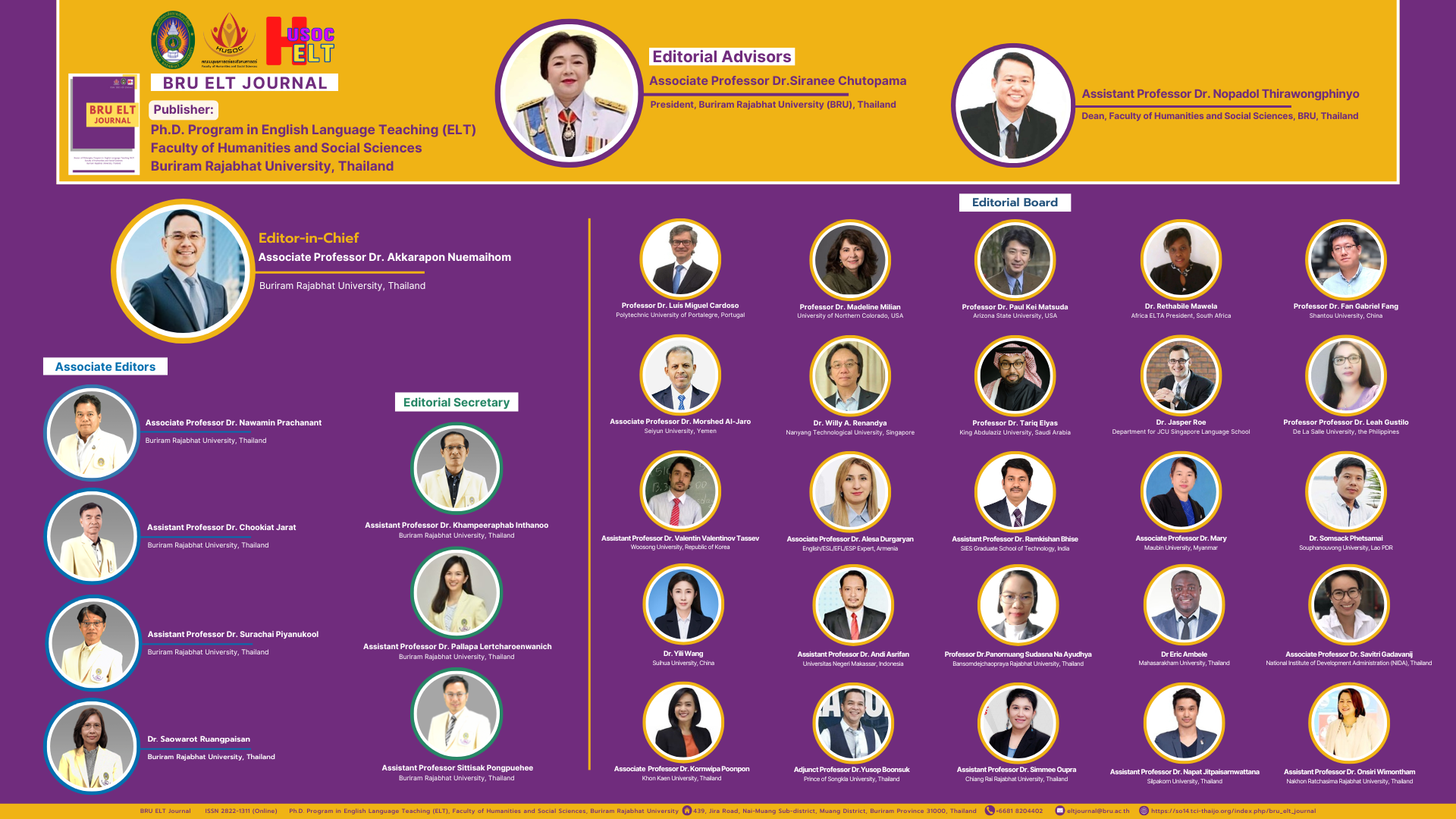Positive Politeness Strategies in the 2020 US Candidate Presidential Debate: Factors Influencing Their Use
DOI:
https://doi.org/10.14456/bej.2023.5Keywords:
politeness, strategies, factors influence, presidential debateAbstract
The United States presidential debate has gained global attention as a critical moment for both candidates to gain support from their electorates. One effective way candidates follow to attract voters is to use positive politeness strategies, which help create a positive impression. Drawing on Brown and Levinson's theory, this study examines the positive politeness strategies used by presidential candidates Donald Trump and Joe Biden during the final presidential debate at Belmont University in 2020. The data for this study were extracted from a video of the debate that was uploaded on YouTube by ‘USA Today.’ The results of this study indicate that both candidates employed positive politeness strategies to varying degrees. These strategies included increasing the interlocutor's interest, using identity markers to establish a sense of belonging, seeking agreement, offering eager audience promises, being optimistic, involving both speakers and the pro-active audience in an interactive discourse, providing or asking for reasons, and giving a positive vibe to the audience. The study revealed that the use of these strategies was influenced by various factors such as the relative power of the interlocutors, social distance, and the level of imposition.
References
Abudayeh, H., & Dubbati, B. (2020). Politeness strategies in translating Donald Trump's offensive language into Arabic. Perspectives, 28(3), 424-439.
Achmad, D. P., Retnowaty, R., & Musdolifah, A. (2020). Strategi Kesantunan Berbahasa dalam Acara Debat Calon Presiden dan Wakil Presiden Tahun 2019 [Language Politeness Strategies in the 2019 Presidential and Vice Presidential
Candidate Debate Events]. Kompetensi, 13(2), 46-58.
Al Syahrin, M. N. (2018). Donald Trump dan Reorientasi Kebijakan Keamanan Amerika Serikat Terhadap Program Pengembangan Senjata Nuklir Korea Utara [Donald Trump and Reorientation of United States Security Policy Towards North Korea's Nuclear Weapons Development Program]. Jurnal Ilmiah Hubungan Internasional, 14(1), 97-111.
Al-Haboobi, Z. A. R. H., & AL-Rikabi, A. A. (2022). The (Im) politeness of political fallacies: A pragmatic analysis. Journal of Language and Linguistic Studies, 18(S1), 705-720.
Ayuningrum, A., Pulungan, R., & Syafrizal, S. (2018). An analysis of politeness strategies applied by the members of Ukm debat, the University of Bengkulu. Journal of English Education and Teaching, 2(4), 1-8.
Azizi, M. H. (2023). Kesantunan Berbahasa Dakwah Struktural pada Debat Politik Para Nabi dalam Al-Qur’an [Politeness in the Language of Structural Da'wah in the Political Debate of the Prophets in the Qur'an]. Dakwatuna: Jurnal Dakwah dan Komunikasi Islam, 9(1), 41-55.
Batubara, M. H., Rahila, C. D. I., & Fitri, H. (2022). An analysis of politeness strategies used By Donald Trump and Hillary Clinton Presidential Debate 2016. Journal of Linguistics, Literature, and Language Teaching (JLLLT), 1(2), 51-58.
Bond, G. D., Speller, L. F., Cockrell, L. L., Webb, K. G., & Sievers, J. L. (2022). ‘Sleepy Joe’and ‘Donald, King of Whoppers’: Reality monitoring and verbal deception in the 2020 US Presidential Election Debates. Psychological Reports, 00332941221105212.
Brown, P., & Levinson, S. C. (1987). Politeness: Some universals in language usage. New York: Cambridge University Press.
Candra, K. D., Markub, M., & Lestari, L. T. (2022). Kesantunan Berbahasa pada Debat Publik Pilbup Kabupaten Gresik Tahun 2020 [Politeness in Language at the 2020 Gresik Regency Pilbup Public Debate]. EDU-KATA, 8(1), 16-28.
Dalimunte, A. A., & Wen, F. (2022). Shaping political image through politeness strategies in the presidential debates. JEES (Journal of English Educators Society), 7(1), 102-109.
Djuyandi, Y., Alfahira, N., & Anwari, G. G. (2021). Penyebab Dilakukannya Pemberhentian Sementara Donor Dana yang Dilakukan Amerika Serikat dan Dampaknya terhadap Keberlangsungan WHO [The cause of the temporary suspension of the United States' donation to the WHO and its impact on the organization's sustainability]. Paradigma POLISTAAT: Jurnal Ilmu Sosial dan Ilmu Politik, 4(2), 82-93.
Felmlee, D. H., Julien, C., & Francisco, S. C. (2023). Debating stereotypes: Online reactions to the vice-presidential debate of 2020. PloS one, 18(1), e0280828.
Fracchiolla, B. (2011). Politeness as a strategy of attack in a gendered political debate-The Royal–Sarkozy debate. Journal of pragmatics, 43(10), 2480-2488.
Gustiani, T., Aslinda, A., & Usman, F. (2022). Strategi ketidaksantunan dalam video debat pemilihan presiden tahun 2019 [Impoliteness strategy in the 2019 presidential election debate video]. SeBaSa, 5(1), 104-119.
Hinck, E. A., & Hinck, S. S. (2002). Politeness strategies in the 1992 vice presidential and presidential debates. Argumentation and Advocacy, 38(4), 234-250.
Hussein, S. (2013). Eksistensi Amerika Serikat sebagai Kekuatan Global [The existence of the United States as a Global Power]. Global and Policy Journal of International Relations, 1(01).
Kwak, M., & Lee, S. (2020). English politeness strategies in the US television presidential debates–focusing on the Presidential Election in 2016. The Journal of Studies in Language, 35(4), 485-502.
Noor, K. U. (2016). Pergeseran Kesantunan Positif Siswa Kelas IX MTs N 1 Surakarta Berlatar Belakang Budaya Jawa [Shift in Positive Politeness of Grade IX Students of MTsN 1 Surakarta with a Javanese Cultural Background]. Kajian Linguistik Dan Sastra, 1(1), 17-24.
Pakzadian, M. (2012). Politeness principle in 2008 presidential debates between Mc Cain and Obama. Mediterranean journal of social sciences, 3(3), 351-357.
Sahide, A. (2019). Krisis Legitimasi Politik Donald Trump Sebagai Ancaman Supremasi Amerika Serikat Dalam Politik Global [Donald Trump's Political Legitimacy Crisis As A Threat To United States Supremacy In Global Politics]. Jurnal Sospol, 5(1), 122-141.
Sibarani, J. G., & Marlina, L. (2018). Politeness strategy used in republican debate by Donald Trump. English Language and Literature, 7(4).
Sihite, M. R., Lubis, S. I., & Silalahi, D. M. A. (2021). Politeness strategies used by the presidential candidates of Indonesia in the 2019 presidential debates. EXCELLENCE: Journal of English and English Education, 1(2), 9-17.






